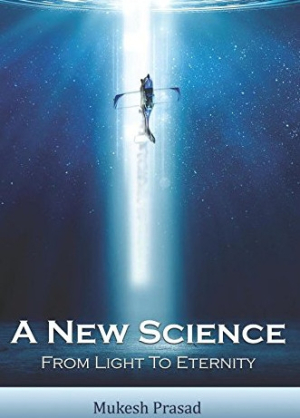
A New Science
From Light To Eternity
Prasad warns against the corruption of a scientific process that must always remain free, open, and democratic.
Mukesh Prasad’s A New Science: From Light to Eternity casts aside some commonly accepted theories about the universe to present startling alternatives in language that is accessible to lay readers and subject-matter experts alike.
In the Internet’s early days, a social network of scientists, some of the best minds in their respective fields, would gather on what was then called “Usenet” to debate topics including the nature of light, relativity, and quantum physics. Prasad, who was a grad student at Yale when he participated in these “battles of the mind,” takes readers on a journey from those days of heady freedom to the present, which he describes as a much darker time for free inquiry.
Prasad employs a free and open “total research” inquiry method that necessitates immersion in contemporary thinking to arrive at his hypotheses. This approach has resulted in theories that he declares have been “peer reviewed by masses of highly knowledgeable peers,” and have even survived the scrutiny of those hostile to them.
Investigations of special and general relativity, the nature of light, the reason for the curvature of space-time, the possibility of the existence of antigravity, and the mathematical possibility of reincarnation are all undertaken with a wider perspective than is usually evident in the work of subject-matter specialists. Clear, simple illustrations enhance the text and help to make complex topics readily understandable.
The book also argues that “a massive corruption of science” is taking place, with one-sided government funding going to projects likely to give the most politically correct result, academia’s suppression of facts that contradict prevailing theories, and a peer-review system that has come to be “based largely on self-preservation” and which, because it is also anonymous, does not allow for accountability.
Prasad is obviously passionate about his subject, and deeply concerned about the direction of current scientific research. His book is well written, attractive, and inviting. Extensive footnotes add depth and clarity to the reading experience.
A New Science, according to Prasad, is an attempt at an “end run around the system”—a way to make the results of transparent, open scientific investigation understandable and available to interested laypeople, students, and fellow scientists alike—and in this he succeeds admirably.
With compelling logic and accessible language, Prasad warns against the corruption of a process that, in order to arrive at correct understandings of the workings of the universe, must always remain free, open, and democratic.
Reviewed by
Kristine Morris
Disclosure: This article is not an endorsement, but a review. The publisher of this book provided free copies of the book and paid a small fee to have their book reviewed by a professional reviewer. Foreword Reviews and Clarion Reviews make no guarantee that the publisher will receive a positive review. Foreword Magazine, Inc. is disclosing this in accordance with the Federal Trade Commission’s 16 CFR, Part 255.
